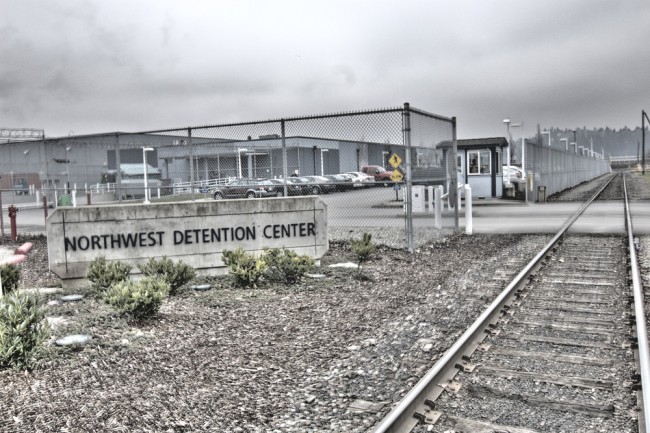
Lawsuit Challenges Federal Immigration Officials over Placing Hunger Strikers in Solitary Confinement at the Northwest Detention Center
Motion seeks to prohibit ICE from retaliating against detainees for peaceful protest
The ACLU of Washington (ACLU-WA) and Columbia Legal Services (CLS) are seeking a Temporary Restraining Order (TRO) to prohibit U.S. Immigration and Enforcement (ICE) from retaliating against detainees who engage in First Amendment-protected activities by placing them in solitary confinement. A hearing on the motion for a TRO will be held on Friday, April 4 at 9:30 am before U.S. District Court Judge Robert Bryan in Tacoma.
“Like other forms of peaceful protest, participation in a hunger strike is a protected First Amendment activity, and detainees should not be punished for it,” said Melissa Lee, Attorney and Institutions Project Coordinator with CLS.
“Retaliating against and punishing immigrant detainees engaged in peaceful protests is an unlawful attempt to chill free speech rights. Like all civil detainees, they have free speech rights protected by the Bill of Rights,” said ACLU-WA Legal Director Sarah Dunne.
Several hundred detainees at the Northwest Detention Center (NWDC) in Tacoma, Washington initiated a hunger strike on March 7, 2014 to express concerns with national immigration policy and to raise awareness about the conditions of their confinement. On March 24 some detainees initiated a new hunger strike. Beginning on March 27, ICE began placing individuals in solitary confinement in retaliation for their support of the hunger strikes. These individuals have been put in solitary confinement where they are kept in cells for 23 hours a day and are deprived of meaningful interactions with others.
The Plaintiffs represented by ACLU-WA and CLS were placed in solitary confinement after corrections officers entered their living area and invited approximately 20 detainees to meet with an assistant warden to discuss their reasons for engaging in a hunger strike. The Plaintiffs and other detainees who volunteered to attend the meeting were immediately placed in handcuffs and taken to individual isolation cells. Plaintiffs were not told why they were placed in solitary confinement nor how long they would have to live in isolation.
The form of solitary confinement used by ICE, administrative segregation, does not require due process because it is supposed to be non-punitive. However, it appears that ICE’s placement of Plaintiffs and other detainees in administrative segregation is in fact punishment and retaliation for engaging in constitutionally protected free speech activities.
Handling the case are ACLU-WA staff attorneys Sarah Dunne, La Rond Baker and Margaret Chen; Columbia Legal Services staff attorneys Melissa Lee, Nick Straley, and Andrea Schmitt; and ACLU-WA cooperating attorney Sal Mungia of the firm Gordon Thomas Honeywell, LLP.




